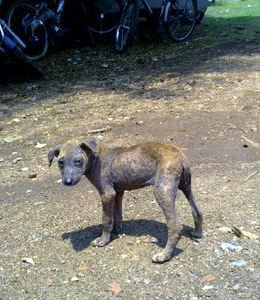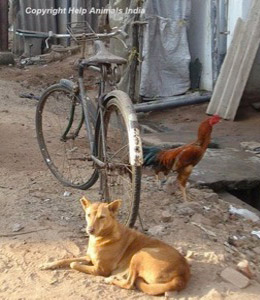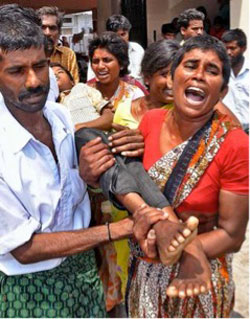News Updates
June 2011: Tragic News – Rabies Crisis in our state of Andhra Pradesh
To all our friends and supporters:
VSPCA has been working hard since 1996 to spay/neuter/vaccinate our area's dogs to prevent the suffering of unwanted puppies and lessen the number of community dogs on our streets.
We have performed operations and vaccinations to over 70,000 dogs, but last year we lost the contract with our locality, who are supposed to do it themselves but have never adequately done so. (See article below from Animal People News, June 2011.) We have been continuing our animal birth control program right outside our city and in those areas such as the town of Bhimli to the north of us (generously funded by the Mayhew Animal Home). Due to our vigilance there is no problem there.
Help us to help a poor pup like this (left) grow up to be a sterilized and vaccinated community dog at home on our city streets (right) – note ear notch that shows he is a graduate of the ABC (animal birth control) programme.
 |
 |
70% of the dog population has to be sterilized and vaccinated in order to curb population growth and arrest the transmission of rabies. The presence of vaccinated, healthy dogs helps to keep rabies out as new unvaccinated dogs cannot move in. Living peacefully in their own communities, these dogs are our partners in the fight against rabies.
Grief-stricken relatives carry the body of 16-year-old Challa Balu who succumbed to rabies at a private hospital in Khammam on Sunday. Photo: G.N. RAO, The Hindu |
However, in our city and in other places in Andhra Pradesh (a state with 70 million people) rabies has now once again reared its ugly head including many heartbreaking human deaths. Shocking facts, as the area's hospitals are il- equipped to adequately provide even human rabies vaccinations and this poor boy (right) died as a result (read the full story here).
Distressing Development
In a time of rabies outbreak people ruthlessly beat dogs to death with sticks. This also further spreads the disease by the spray of infected droplets from the animal. Even some pet dogs are being thrown into the street as fear and panic breaks out. Now there are many clandestine operations to relocate the dog which only further exacerbates the problem bringing in unvaccinated dogs to new areas. We are verifying reports of hundreds of dogs being killed, soon it may be thousands.
Eye witnesses reported a brutal cull of approximately 150-200 dogs in the old bus stand area of Kakinada on June 2nd, 2011. The orchestrators, allegedly connected to municipal authority, hired children, aged 12-14, to kill the dogs. Watch this video for more information:
Activists who challenged the atrocity were harassed and threatened. The activists did manage to file a police complaint.
VSPCA stopped this many times in the past and it is once again time for us to step up this vital project to now protect as many dogs as possible. VSPCA wants to work very hard to vaccinate all the dogs in our area and for that we need everyone's help. Our ambitious plan is to protect 40,000 dogs, each vaccinate costs $1 each when we factor in all costs of catching the dogs to vaccinate.
If we can get this situation under control we will then continue to work very hard to receive funding to continue and increase our animal birth control project to help as many dogs as possible.
Your kind contribution of any amount will go towards this effort and with each dollar you contribute you are saving a dog's life. Thank you for your compassion!
With continuing heartfelt gratitude,
Visakha Society for Protection and Care of Animals
Article from Animal People News, June 2011:
Refusing to make "donation" to politicians, Visakha SPCA loses animal control contract; rabies outbreak follows suspension of subsidized dog sterilization & vaccination service
VISAKHAPATNAM – Rabies is reportedly raging again in northern Andhra Pradesh state, India, a year after a newly elected Greater Visakhapatnam Municipal Corporation government took responsibility for operating the local Animal Birth Control program away from the Visakha SPCA.
The action in effect dismantled what was by far the largest anti-rabies campaign in the region, and led to the Visakhapatnam street dog population reportedly increasing from about 7,000 to as many as 10,000.
At least seven human rabies fatalities and incidents of rabid dogs and even a rabid horse running amok, biting dozens of people, were reported in May 2011 from around a crescent extending from Srikakulam and Parvathipuram in the northernmost panhandle of Andhra Pradesh, above Visakhapatnam, through the Visag and Aruku districts to the west of Visakhapatnam, to Kakinada and Rajamundry, south of Visakhapatnam, along the River Godavari.
Unclear, however, was if the region actually had an increase in rabies cases, or just had heightened awareness of rabies as result of media attention to deaths and dog attacks. The Hindu reported that 20 human rabies deaths occurred in East Godavari in 2010, 42 in 2009, 23 in 2008, and 54 in 2007.
From 1998 to June 2010 the Visakha SPCA sterilized and vaccinated dogs for Visakhapatnam, replacing a corps of for-profit dogcatchers who electrocuted strays, sold dog leather, and responded to losing the dog control contract with a combination of violence and defamatory political attacks.
Persevering to eradicate rabies from the inner metropolis by 2007, the VSPCA gradually extended sterilization and vaccination service into the suburban areas known as the Visakhapatnam Circle, which have approximately quadrupled in human population since the VSPCA program began.
The sterilization and vaccination work was partially subsidized after 2003 by the Indian federal Animal Birth Control program. By the time political control of the Visakhapatnam regional government changed hands in November 2009, the amount of funding involved looked to some of the newly elected GVMC officials like a significant patronage plum to reallocate to supporters.
To keep the ABC contracts, Visakha SPCA founder Pradeep Kumar Nath told ANIMAL PEOPLE, he was asked to pay "astronomical sums" to the parties in power, and to agree to allowing city dogcatchers to dump outside of town any dogs whose behavior produced complaints. Nath refused both conditions. The municipal dogcatchers began dumping dogs outside of town anyway, leading to complaints to local newspapers about problem dogs finding their way back even from 20 miles away, and to dogs being dumped near Nath's home, in the oldest part of the city.
Named GVMC veterinary officer, B. Rammohana Rao announced soon after his appointment that the ABC and anti-rabies vaccination programs would henceforth be done under his auspicies. The programs appear to have been started only after rabies cases were again reported within the GVMC.
ABC India
Nath meanwhile kept the Visakha SPCA veterinary team together by forming ABC India, a teaching-and-training program now deployed against the rabies outbreaks.
"Dog culls have been reported in Rajahmundry, Vizianagram, and surrounding areas," ABC India managing director Lisa Warden told ANIMAL PEOPLE. "ABC India teams are doing anti-rabies vaccination in Rajahmundry in extreme heat and occasional heavy rain. Anti-rabies vaccination has begun in Kakinada. We hope to contribute teams there to expand their capacity. We expect to begin anti-rabies vaccination in Visakhapatnam forthwith. The programs in each locale need to be expanded at the earliest to ensure adequate coverage," Warden said. ABC India has also begun educating against translocating dogs, implicated in spreading rabies from place to place. "Rabies keeps appearing in different places in Andhra Pradesh that are not close enough to each other to be within a dog's regular range," Warden explained. As an unvaccinated dog may incubate and transmit rabies through bites for weeks before active symptoms appear, seemingly healthy dogs are often rabies vectors.
"We have prepared a short film about rabies prevention to show throughout Andhra Pradesh," Warden added. "It is currently being translated into the Telegu language. We will provide it to all districts and local television stations and it will be available on our website. Additional teams, vaccines, and financial support are urgently required," Warden finished, "to prevent further human deaths and dog culls."



